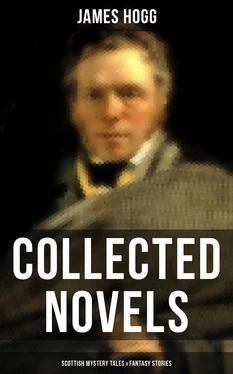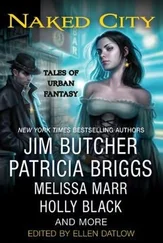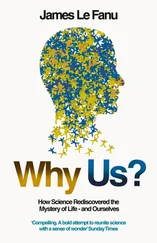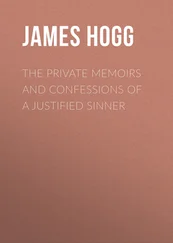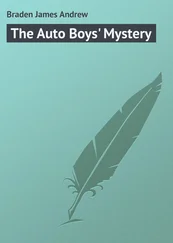“Sure, Mr. Colwan, you won’t go to bed to-night, at such an important period of your life, without first saying prayers for yourself and me.”
When she said this, the laird had his head down almost to the ground, loosing his shoe-buckle; but when he heard of prayers, on such a night, he raised his face suddenly up, which was all over as flushed and red as a rose, and answered:
“Prayers, Mistress! Lord help your crazed head, is this a night for prayers?”
He had better have held his peace. There was such a torrent of profound divinity poured out upon him that the laird became ashamed, both of himself and his new-made spouse, and wist not what to say: but the brandy helped him out.
“It strikes me, my dear, that religious devotion would be somewhat out of place to-night,” said he. “Allowing that it is ever so beautiful, and ever so beneficial, were we to ride on the rigging of it at all times, would we not be constantly making a farce of it: It would be like reading the Bible and the jestbook, verse about, and would render the life of man a medley of absurdity and confusion.”
But, against the cant of the bigot or the hypocrite, no reasoning can aught avail. If you would argue until the end of life, the infallible creature must alone be right. So it proved with the laird. One Scripture text followed another, not in the least connected, and one sentence of the profound Mr. Wringhim’s sermons after another, proving the duty of family worship, till the laird lost patience, and tossing himself into bed, said carelessly that he would leave that duty upon her shoulders for one night.
The meek mind of Lady Dalcastle was somewhat disarranged by this sudden evolution. She felt that she was left rather in an awkward situation. However, to show her unconscionable spouse that she was resolved to hold fast her integrity, she kneeled down and prayed in terms so potent that she deemed she was sure of making an impression on him. She did so; for in a short time the laird began to utter a response so fervent that she was utterly astounded, and fairly driven from the chain of her orisons. He began, in truth, to sound a nasal bugle of no ordinary calibre—the notes being little inferior to those of a military trumpet. The lady tried to proceed, but every returning note from the bed burst on her ear with a louder twang, and a longer peal, till the concord of sweet sounds became so truly pathetic that the meek spirit of the dame was quite overcome; and, after shedding a flood of tears, she arose from her knees, and retired to the chimney-corner with her Bible in her lap, there to spend the hours in holy meditation till such time as the inebriated trumpeter should awaken to a sense of propriety.
The laird did not awake in any reasonable time; for, he being overcome with fatigue and wassail, his sleep became sounder, and his Morphean measures more intense. These varied a little in their structure; but the general run of the bars sounded something in this way: “Hic-hoc-wheew!” It was most profoundly ludicrous; and could not have missed exciting risibility in anyone save a pious, a disappointed, and humbled bride.
The good dame wept bitterly. She could not for her life go and awaken the monster, and request him to make room for her: but she retired somewhere, for the laird, on awaking next morning, found that he was still lying alone. His sleep had been of the deepest and most genuine sort; and, all the time that it lasted, he had never once thought of either wives, children, or sweethearts, save in the way of dreaming about them; but, as his spirit began again by slow degrees to verge towards the boundaries of reason, it became lighter and more buoyant from the effects of deep repose, and his dreams partook of that buoyancy, yea, to a degree hardly expressible. He dreamed of the reel, the jig, the strathspey, and the corant; and the elasticity of his frame was such that he was bounding over the heads of maidens, and making his feet skimmer against the ceiling, enjoying, the while, the most ecstatic emotions. These grew too fervent for the shackles of the drowsy god to restrain. The nasal bugle ceased its prolonged sounds in one moment, and a sort of hectic laugh took its place. “Keep it going—play up, you devils!” cried the laird, without changing his position on the pillow. But this exertion to hold the fiddlers at their work fairly awakened the delighted dreamer, and, though he could not refrain from continuing, his laugh, beat length, by tracing out a regular chain of facts, came to be sensible of his real situation. “Rabina, where are you? What’s become of you, my dear?” cried the laird. But there was no voice nor anyone that answered or regarded. He flung open the curtains, thinking to find her still on her knees, as he had seen her, but she was not there, either sleeping or waking. “Rabina! Mrs. Colwan!” shouted he, as loud as he could call, and then added in the same breath, “God save the king—I have lost my wife!”
He sprung up and opened the casement: the day-light was beginning to streak the east, for it was spring, and the nights were short, and the mornings very long. The laird half dressed himself in an instant, and strode through every room in the house, opening the windows as he went, and scrutinizing every bed and every corner. He came into the hall where the wedding festival had been held; and as he opened the various windowboards, loving couples flew off like hares surprised too late in the morning among the early braird. “Hoo-boo! Fie, be frightened!” cried the laird. “Fie, rin like fools, as if ye were caught in an ill-turn!” His bride was not among them; so he was obliged to betake himself to further search. “She will be praying in some corner, poor woman,” said he to himself. “It is an unlucky thing this praying. But, for my part, I fear I have behaved very ill; and I must endeavour to make amends.”
The laird continued his search, and at length found his beloved in the same bed with her Glasgow cousin who had acted as bridesmaid. “You sly and malevolent imp,” said the laird; “you have played me such a trick when I was fast asleep! I have not known a frolic so clever, and, at the same time, so severe. Come along, you baggage you!”
“Sir, I will let you know that I detest your principles and your person alike,” said she. “It shall never be said, Sir, that my person was at the control of a heathenish man of Belial—a dangler among the daughters of women—a promiscuous dancer—and a player of unlawful games. Forgo your rudeness, Sir, I say, and depart away from my presence and that of my kinswoman.
“Come along, I say, my charming Rab. If you were the pink of all puritans, and the saint of all saints, you are my wife, and must do as I command you.”
“Sir, I will sooner lay down my life than be subjected to your godless will; therefore I say, desist, and begone with you.”
But the laird regarded none of these testy sayings: he rolled her in a blanket, and bore her triumphantly away to his chamber, taking care to keep a fold or two of the blanket always rather near to her mouth, in case of any outrageous forthcoming of noise.
The next day at breakfast the bride was long in making her appearance. Her maid asked to see her; but George did not choose that anybody should see her but himself. He paid her several visits, and always turned the key as he came out. At length breakfast was served; and during the time of refreshment the laird tried to break several jokes; but it was remarked that they wanted their accustomed brilliancy, and that his nose was particularly red at the top.
Matters, without all doubt, had been very bad between the new-married couple; for in the course of the day the lady deserted her quarters, and returned to her father’s house in Glasgow, after having been a night on the road; stage-coaches and steam-boats having then no existence in that quarter.
Читать дальше
